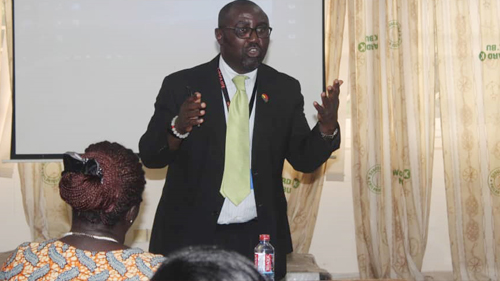Dr. Albert Akpalu speaking at the meeting
More than half of Ghana’s population has never checked their blood pressure before, Dr. Efua Commeh, Deputy Programmes Director, Non-Communicable Disease, Ghana Health Service (GHS), has revealed.
She explained that the only time people get to have their blood pressure checked is when they get sick and are sent to the hospital.
“We do studies on patients who come and most of them being tested in the hospital is the first time they get to check their blood pressure and so most of the time they realise they have hypertension and they are prone to develop stroke,” she said.
The deputy director added that figures indicate that uncontrolled hypertension is one of the major causes of stroke, however, most of the people do not know their blood pressure.
“What we hear people saying is that oh! nothing was wrong with her she just collapsed but blood pressure does not have any symptoms so before you realize, it gets out of hand,” she observed.
Dr. Commeh mentioned that stroke has consistently been the number one cause of death in hospitals but not the number one for admissions.
“The number of people coming down with stroke who are less than forty is much more than 10 to 15 years ago
There is a new trend of young people coming in with hypertension. We are having 35 and 29 year olds getting stroke and before you get to stroke you would have had the hypertension for a number of years,” she explained.
Dr. Commeh was speaking at a stakeholders meeting held in commemoration of World Stroke Day at the Korle-Bu Teaching Hospital (KBTH).
Stroke Management
She hinted that the stroke treatment outcome in the country is not positive, as some hospitals are recording about 50 per cent mortality because patients do not get enough coordinated care.
“We are losing a lot of our patients in the districts and the regions because healthcare officers are not adequate but if they are lucky enough to come to the city hospitals, it is much better,” she opined.
She also bemoaned the delay in getting people who have suffered stroke to the hospital saying, “If the person develops a stroke and within three hours you can get the person to the hospital you can reverse it but people are coming after days and when they come there is little we can do and the outcome most times is fatal.”
Wessex Programme
Presenting the Wessex sponsored ‘Ghana Stroke Project’ to participants, Dr. Albert Akpalu said it was initiated to improve stroke care of patients through a new concept of a multi-disciplinary team care.
“So not only the nurses and doctors who can manage the patients but it is a whole team which involves a doctor, nurse, physiotherapist, dietician, psychologist, occupational therapist who work together in one place to manage stroke through a coordinated care to improve the outcome of the case,” he stated.
Dr. Akpalu further added that the nine-year project has seen other nurses at the La General and Greater Accra Regional Hospitals being trained.
He said the physical, mental and economic burden of stroke to families and caregivers are enormous and, thus, called on government to “at least provide one district with a CT scan to make the condition easy to manage.
By Jamila Akweley Okertchiri


